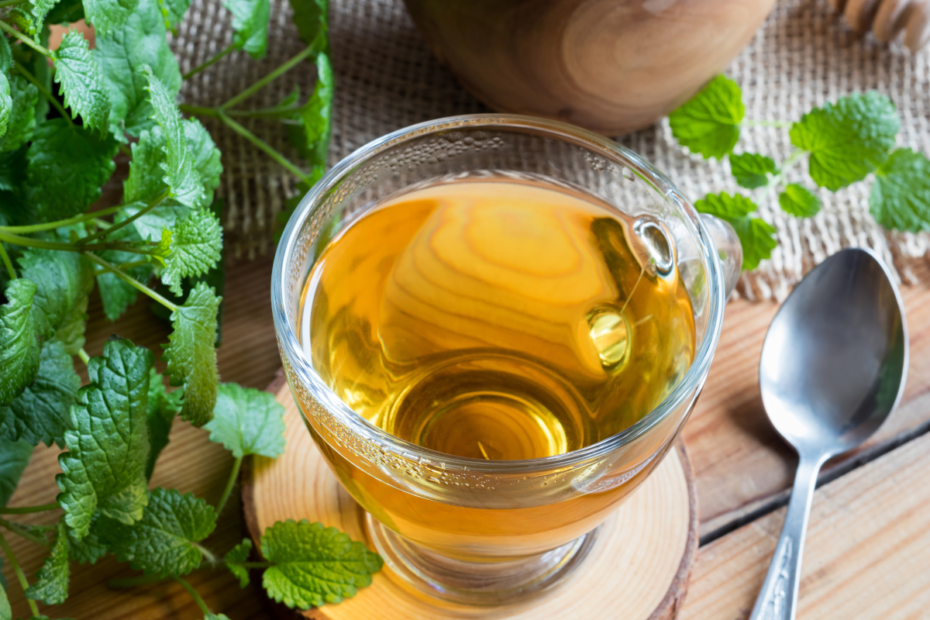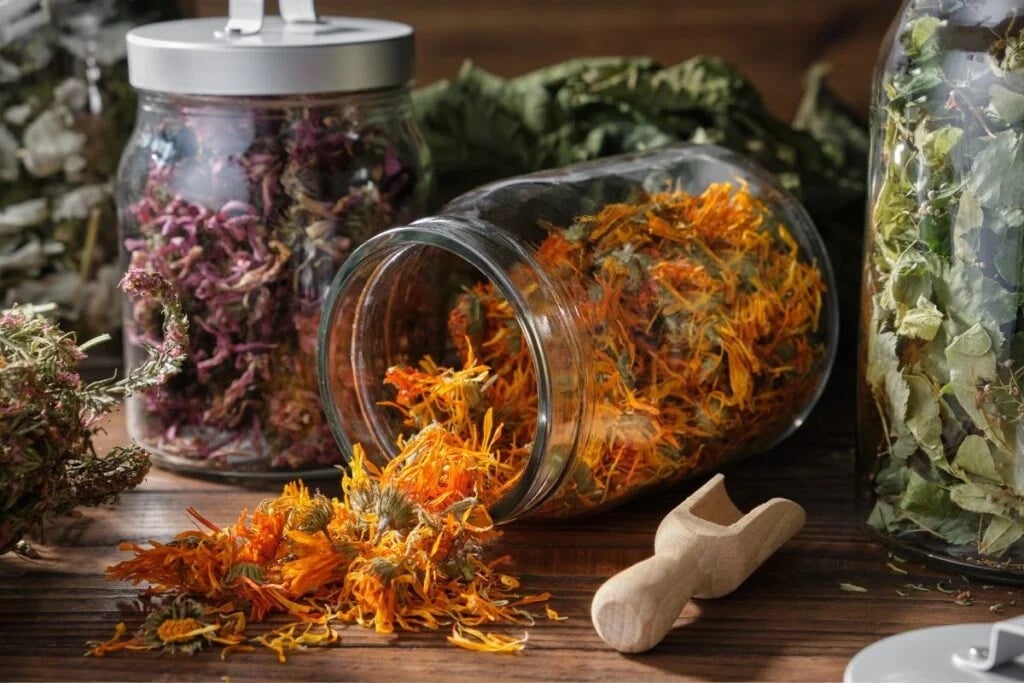Lemon balm (Melissa officinalis) is a species in the Lamiaceae family, genus Melissa. It is a source of relaxing drink. Lemon balm tea benefits include being often used in the evening to help calm the mind and improve sleep quality.
Lemon balm is a perennial herbaceous plant that grows up to 30–120 cm tall. The stem is steep, branched, and covered with hairs. The leaves and stems produce a pleasant lemon-scented essential oil. This substance allowed you to drink it cold on hot summer days and hot in the cold season.
The clustered flowers are in clusters of 3–12, and the corolla is whitish, pink, or pale pink. Lemon balm fruits are dark brown nuts. This species grows in meadows, gardens, and orchards.
Due to the pleasant aroma of the essential oil, lemon balm is a part of some liqueurs, perfumery, and medicinal products. The plant is rich in essential oils, bitter substances, organic acids, tannins, and other substances, such as vitamin C. Collect the leaves in June–September, when the plant is in flower, for medicinal purposes.
Lemon Balm Tea Benefits
- Lemon balm tea can reduce stress, anxiety, and nervousness, help you relax, and lift your mood. If you are experiencing psychological stress at work and its effects on your mood, you should drink lemon balm tea during your breaks.
- Drink some lemon balm tea when you suffer from insomnia or restless sleep. It will help reduce restlessness and sleep disturbances. Combine lemon balm with valerian and take it before bed for a higher effect.
- Lemon balm tea can help your digestive tract if you have stomach pain. Add 1 teaspoon of chopped lemon balm leaves to food or a smoothie.
- Lemon balm can help with nausea. As soon as you feel the first symptoms of nausea, drink some tea.
- This drink is also beneficial for relieving the symptoms of premenstrual syndrome (PMS) and menstrual cramps. The tea is most effective throughout the cycle, not just when symptoms have already appeared.
- It can relieve mild headaches. For more severe pain, it may be more effective to take crushed lemon balm leaves with food (for example, add one teaspoon to a smoothie).
- Drink tea for toothaches, and put the lemon balm leaves on your lips. You can use lemon balm essential oil diluted with another vegetable-based oil you have.
- Lemon balm tea can lower blood pressure while protecting against severe heart problems.
- Use the tea externally for skin conditions.
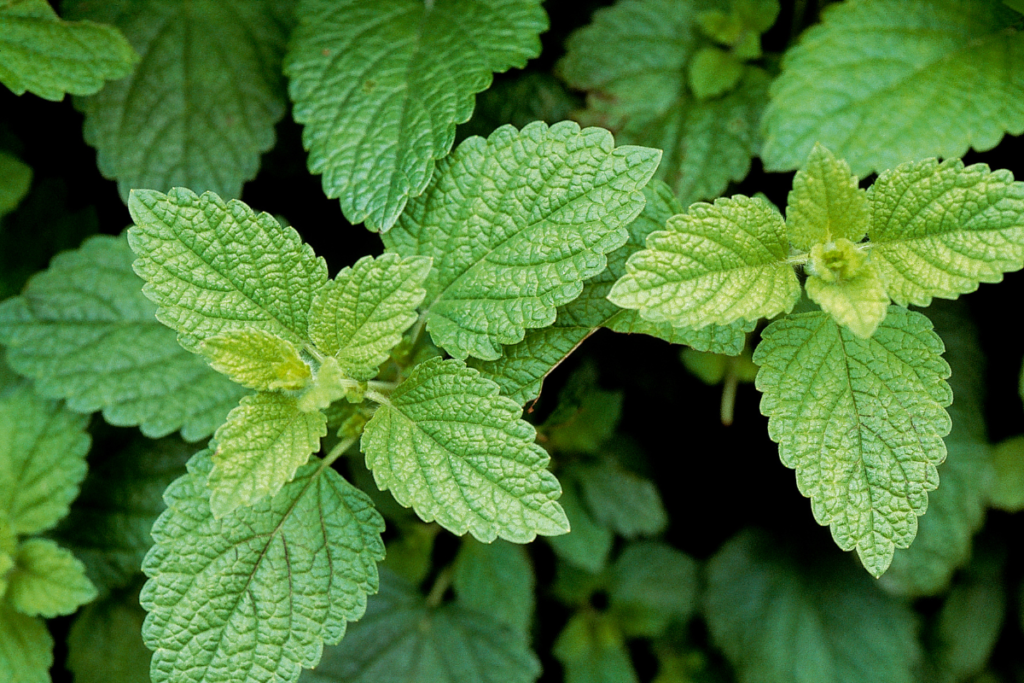
Benefits of Lemon Balm Tea for Children and Babies
Lemon balm tea for children is soothing, and calming. It relieves fear, anxiety, and irritability, and reduces pain and insomnia. Give this drink to babies as early as 9 months. Lemon balm mixed with lavender will calm the baby even more. Only give children freshly brewed, lukewarm, and unsweetened tea. To avoid bitterness, make it less strong. If you need to take the lemon balm tea daily, do so for a maximum of 2 weeks, and then take a break of at least 2 weeks.
Studies have shown that lemon balm tea for breastfeeding babies is harmless and safe to use with chamomile and fennel. It helps babies with colic, diarrhea, and other illnesses. However, consume this tea in small quantities; smaller amounts in breast milk will not be harmful.
Lemon Balm Tea Characteristics
This tea has a citrus taste with a hint of mint and a lemony aroma. This lovely drink goes well with other herbs or teas. You can sweeten it with different sweeteners, so you can use your imagination and try to discover new flavors.
You can buy lemon balm leaves in shops. Even more, you can try to grow them in your garden, kitchen garden, or even at home on your windowsill. Dried or fresh leaves, freshly picked from the lemon balm growing in your garden, can be used for homemade lemon balm tea.
Mellisa Leaves Harvesting
If you want to dry lemon balm leaves, pick them once before the plant starts to flower. This is when the plants concentrate the most antioxidants and essential oils, giving them more health benefits and a better taste. Cut the leaflets of the lemon balm at the stem, just above the second row of leaves. Pruning the plant in this way will encourage the growth of new shoots and increase the yield. Rinse the fresh leaf with cold water and dry it.
Alternatively, you can dry the lemon balm by cutting the stems, tying them in bundles, and hanging them in a well-ventilated room out of the sunlight. Store the dried lemon balm leaves in an airtight container or paper bag in a dark place. Dried leaves will retain their premium taste for several months.
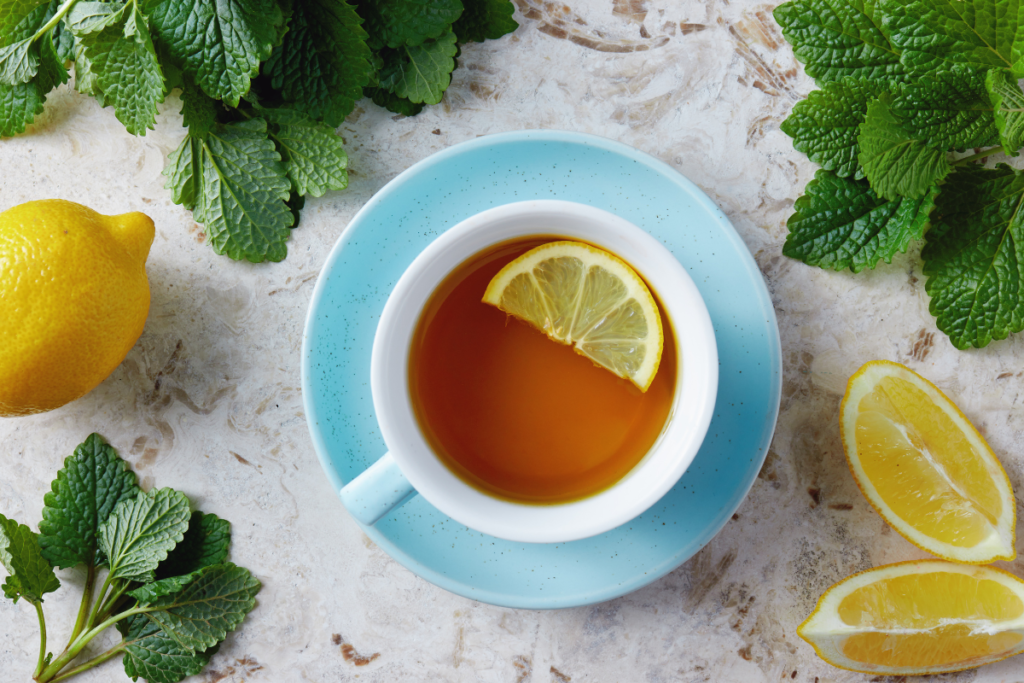
How to Make Lemon Balm Tea
To make lemon balm tea, you will need:
- 1 tablespoon of dried lemon balm leaves or 2 handfuls of fresh leaves
- 1 liter of water
- your favorite sweetener (honey, sugar, agave, or other syrup).
Put the lemon balm leaves in a saucepan or teapot and cover with boiling water. Allow the herbs to steep for 5–10 minutes before pouring them into cups. Then flavor it with the sweetener. You can combine lemon balm with other herbs you like.
Sun Tea of Lemon Balm: For a Hot Summer Day
You don’t need a kettle to make this tea, so you can easily make it in nature.
For the recipe, you need:
- A large glass bowl
- 4 tablespoons of dried lemon balm or 8 tablespoons of fresh leaves
- 2 liters of cool water
- The sunlight exposure
Place the lemon balm leaves in a glass container and pour in the water. Place the container outside in direct sunlight and leave it for 3–4 hours to allow the tea to steep. Pour into cups and serve with ice cubes.
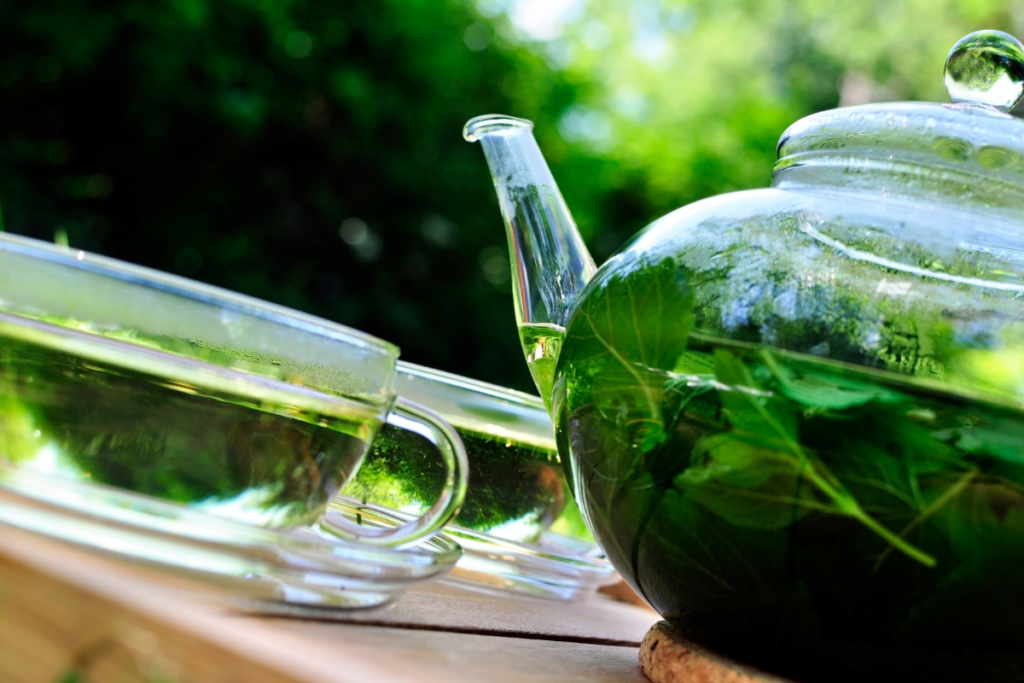
Possible Side Effects of Lemon Balm
Drinking lemon balm tea, even daily, is unlikely to cause any side effects. The risk is increased if you take the lemon balm leaves with food. In this case, eat no more than 2 g per day for a maximum of 4 months. After that, you should take a break.
If too much lemon balm is consumed, side effects may include headaches, painful urination, increased temperature, nausea, vomiting, stomach pain, dizziness, and allergies.
Lemon balm tea seems to be an acceptable choice during pregnancy, as it is soothing, helps to improve appetite, reduces nausea, etc. However, you should use this tea in moderation. Too much of it can have the opposite effect: the herbs can cause headaches or even miscarriage.
If you have any medical conditions or are taking medication (especially for glaucoma, thyroid disorders, or tranquilizers), you should consult your doctor before taking lemon balm leaves or supplements.
Research sources:
https://www.sciencedirect.com/science/article/pii/S0944711306000250
https://www.sciencedirect.com/science/article/pii/S0378874116302732?via%3Dihub
Associative photos from © Canva.
